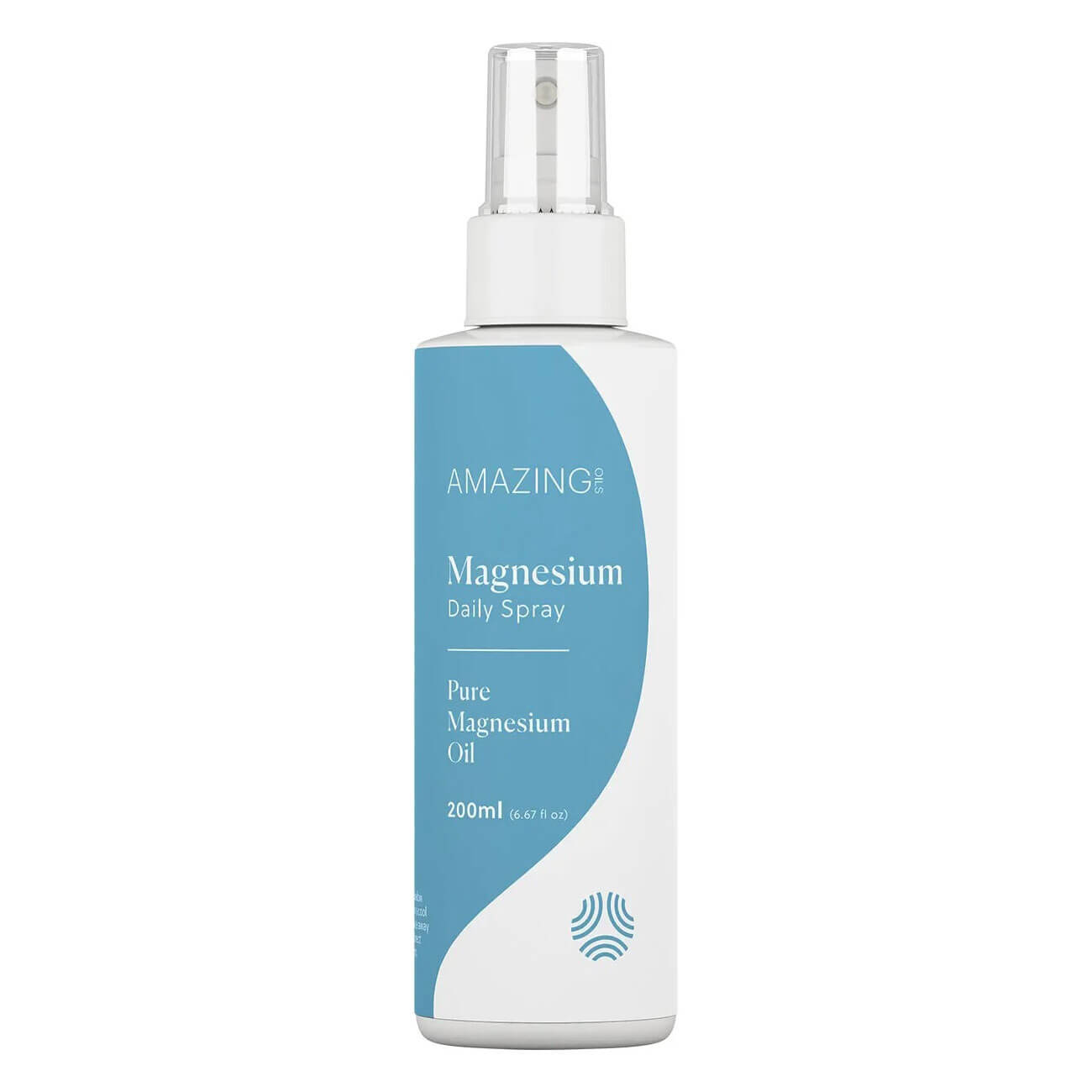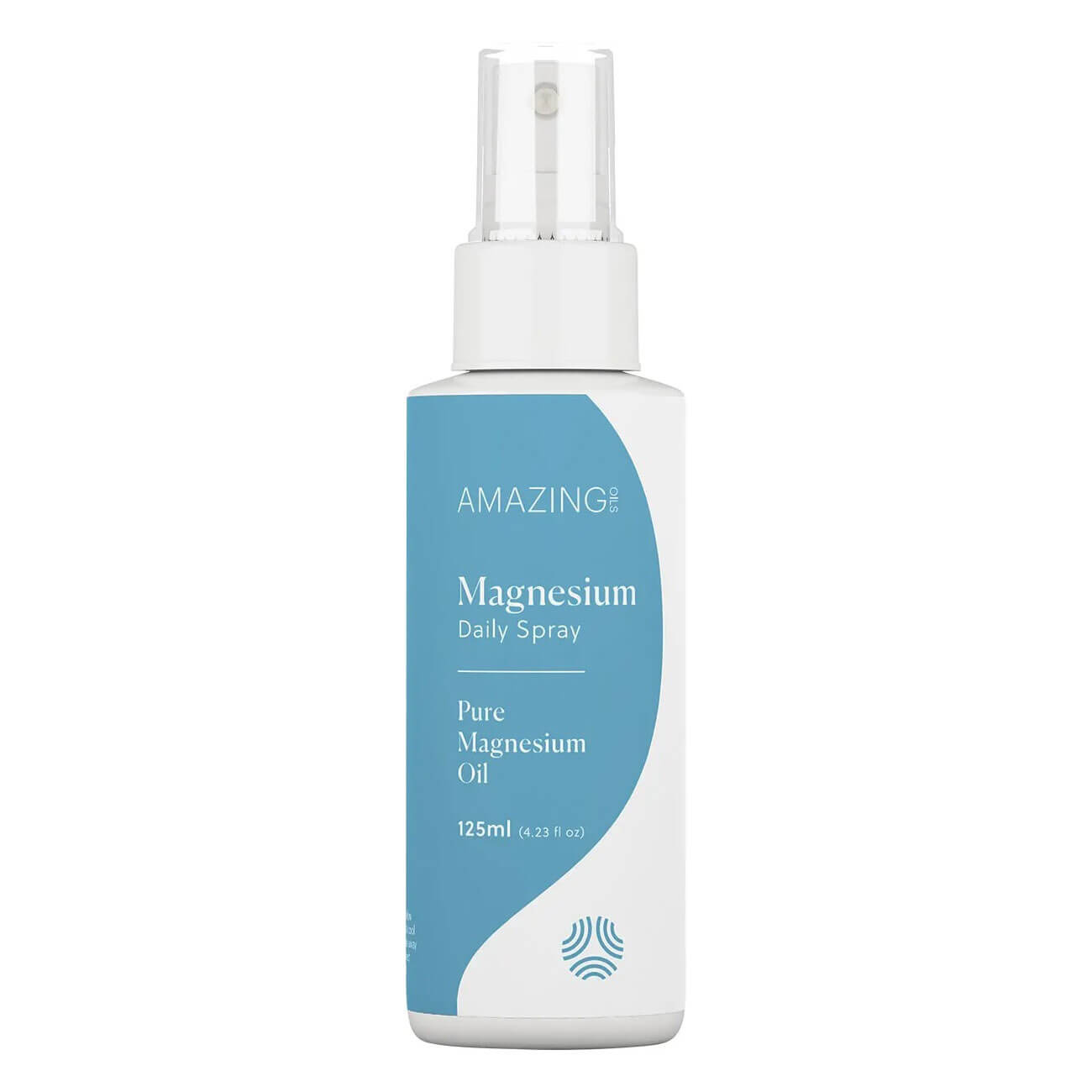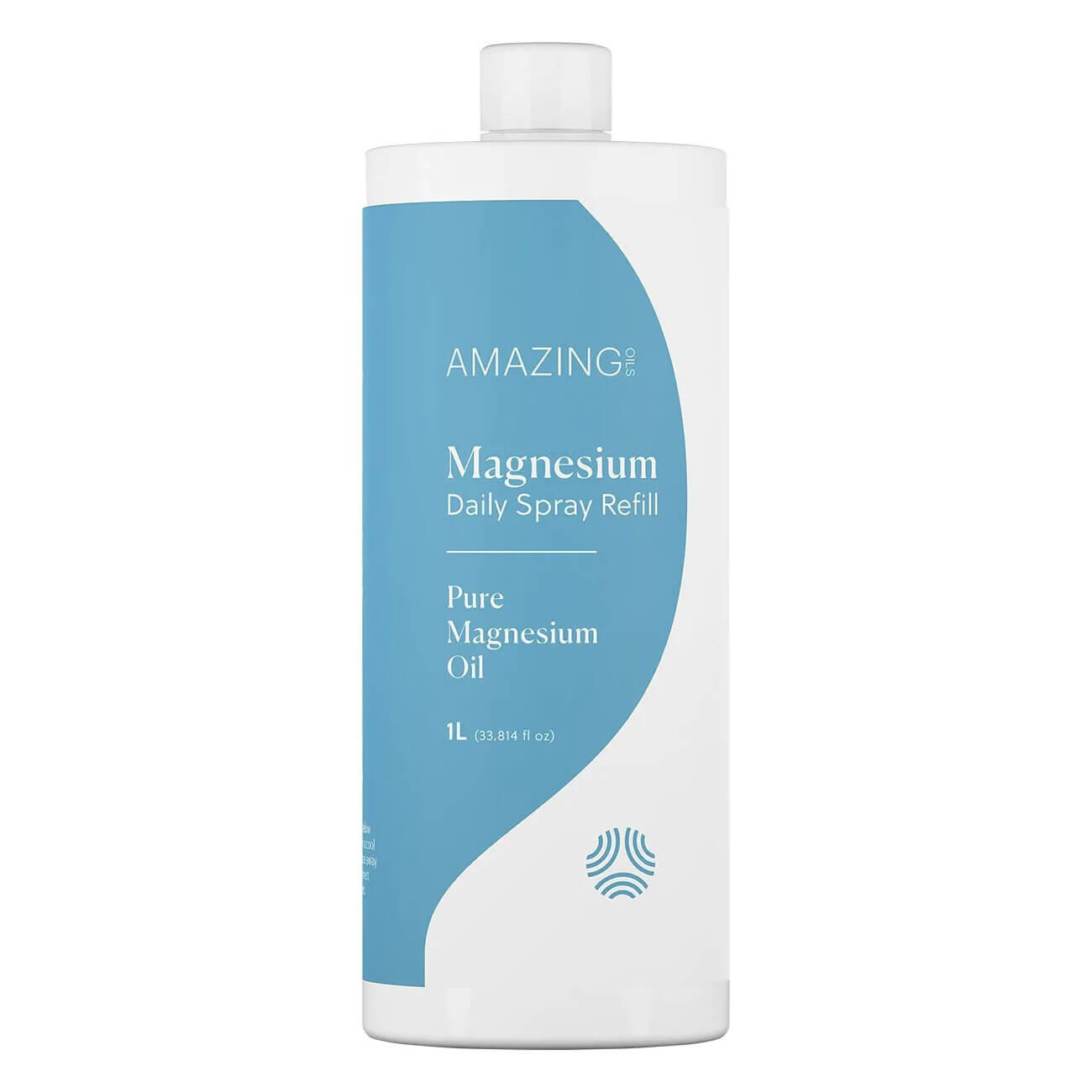Magnesium Daily Spray - Pure Magnesium Oil - Amazing Oils
,gravity=Center,allowExpansion)
,gravity=Center,allowExpansion)
,gravity=Center,allowExpansion)
,gravity=Center,allowExpansion)
Collect 27 Everyday Rewards points
,gravity=Center,allowExpansion)
,gravity=Center,allowExpansion)
,gravity=Center,allowExpansion)
,gravity=Center,allowExpansion)
Collect 27 Everyday Rewards points
A simple, effective way to raise your magnesium levels.
Contains only our 100% pure, organically sourced Magnesium Oil, from the Salt Lakes of Australia.
(formerly known as Natural Relief Magnesium Spray)
Adding topical magnesium into your daily routine is a great way (efficacious & bio-available) to gain the benefits of magnesium and assist in preventing magnesium deficiency.
Australian - Organically Sourced - Natural Magnesium
What is the 'oil' in the product?
While commonly referred to as 'Magnesium Oil' this liquid contains no oil. The Magnesium liquid brine is organically sourced from natural salts lakes in Australian deserts.
How long will this product last?
What is magnesium?
Magnesium is one of the most important minerals in the human body. It is an essential cofactor for more than 300 chemical reactions, including those relating to heart health, vascular tone, nerve function and muscle contraction and relaxation. Magnesium is also necessary for tooth and bone formation, protein synthesis and cell division. In addition magnesium contributes to normal energy metabolism, healthy psychological function, reducing tiredness and fatigue; and in children magnesium contributes to normal growth and development.
Magnesium deficiency is increasingly being implicated in a large number of health conditions with much research ongoing. One of the ways we've traditionally consumed magnesium is through our diet, however, due to soil depletion from modern farming practices, minerals have been stripped from the soil.
What is magnesium oil (topical magnesium)?
Magnesium chloride (nicknamed magnesium oil) is an easy-to-absorb form of magnesium that has the ability to raise levels of magnesium within the body when applied topically to the skin.
Can you have too much magnesium?
You do not need to worry about overdoing it when using topical magnesium. The upper limits (mg per day) are only relevant when using the product orally, as large doses can have a laxative effect due to it being a natural relaxant.
Toxic symptoms from increased magnesium intake are not common as the body eliminates excess amounts, unless there are serious problems with kidney function (see below for who should/should not use topical magnesium).
What is the difference between topical and oral methods of magnesium?
As well as a balanced diet rich in leafy green vegetables, nuts, seeds and whole grains, we also recommend using a magnesium supplement (as modern farming methods have reduced the level of minerals in the soil). Many forms of magnesium supplementation (both in topical and oral methods) are available and different forms may suit you more than others, you may even prefer a combination of the two.
Oral Magnesium
Magnesium in tablet or liquid form has been a common supplement for years to help improve levels and absorption. However, evolving research is showing that Magnesium delivered orally can be compromised by our digestive systems and limit the amount of active magnesium being absorbed and delivered where the body needs it most.
Topical Magnesium
Magnesium Chloride, when applied topically or transdermally via the skin, can help to improve your magnesium levels and reduce the ailments that are common with magnesium deficiencies. The absorption and bio-availability has been measured to be greater.
What is magnesium deficiency?
Over time, low magnesium can weaken your bones, give you bad headaches, make you feel nervous, and even affect your heart health. It can also lead to low levels of other important minerals like calcium and potassium. Although it's hard to measure your magnesium levels (see question below) the most commonly used method is observing common symptoms of magnesium deficiency, such as weakness/fatigue, tremors, cramping and twitching. High levels of magnesium are much less common than low levels. This happens to people who have damaged kidneys, or take certain drugs.
Some of the contributing factors present in our Western lifestyle include; increasing reliance on refined foods, as the processing removes essential minerals, consumption of processed, soft (demineralised) water and other drinks, consumption of coffee and alcohol, increased stress and production of (hormone) cortisol.
How do I know if I am magnesium deficient?
It can be difficult to tell if you are deficient in magnesium. Around 99% of your body's magnesium is stored in your bones, muscles and other soft tissues. Magnesium is tightly regulated by your body and only 1% is circulating in your intracellular fluid and blood, so blood serum tests are unlikely to provide much information about whether your body's store of magnesium is adequate.
Weakness, tremors, cramping and twitching are all signs of hypomagnesaemia (low magnesium), but these may only manifest if magnesium is becoming very low. Your magnesium stores may be sub-optimal without any of these symptoms being present.
Is it safe to use if I'm pregnant or breastfeeding?
Not only is it safe, it is recommended to better support your magnesium levels whilst you are pregnant or breastfeeding. However, it is important that during pregnancy you avoid certain essential oils. Our Magnesium Active Range contain essential oils such as wintergreen that are not recommended during pregnancy.
All of our other Magnesium products are suitable during pregnancy and breastfeeding.
...Orders leave our warehouse within 1-2 business days.
Delivery time will then be based on Australia Post or the courier used.
Please note that during busy periods (such as major sales and over Christmas), our handling times may increase as we work through orders, however we always do our very best to get everything out as quickly as we can.
After your order has been placed, picked and packed, you will receive an email notification advising you that your order has been shipped. This email will contain your tracking information.
All orders sent within Australia require a signature on delivery. If you are not available to sign for your order, Australia Post will leave a note with instructions for pick up from a designated post office. If you are an Australia Post My Post customer you may be contacted by Australia Post prior to delivery offering their Safe Drop service where you waive the requirement for a signature. Note: if you elect to use this service, the agreement is between you and Australia Post, and Nature's Wonderland takes no responsibility for any lost or damaged items due to the use of this service.
While we do everything we can to ensure your order is delivered in a timely manner, we will not be liable for any loss or damage incurred by any person as a result of delay caused by our carrier that we have no control over or by any event which is out of our reasonable control or foresight including, but not limited to, any delay caused by an incorrect delivery address being provided to us.
If you are not fully satisfied with your purchase, you can return your product for a full refund, exchange or repair. Your rights to a remedy under the Australian Consumer Law are not limited by a defined time. However, the Australian Consumer Law does recognise that the relevant time period can vary from product to product, depending on factors such as the nature of the product and the price. Nature's Wonderland adopts the same approach. The type of remedy we can offer you may also vary depending on how long it takes you to return the product to us. At Nature's Wonderland, we will always take a fair and reasonable approach.
To be eligible for a return, your item must be unused and in the same condition that you received it. It must also be in the original packaging.
You are eligible to receive a refund, exchange or repair provided that:
The product is faulty or is not of acceptable quality
You receive the wrong product
The product does not match the photos or description
The product is in resaleable condition and in its original packaging, including instruction manuals and all accessories, all labels are still attached, and it is not dirty or in otherwise poor condition (unless it arrived as such)
You are not entitled to receive a refund if you:
Change your mind or decide you no longer want or like the goods
Are not happy with the performance of the product, when it performs exactly as described
Found a fault or imperfection when it is clearly listed on the product's page
Damage the goods after receiving them (provided it is not due to a fault in the item)
If these requirements are not satisfied, Nature's Wonderland reserves the right not to offer an exchange or refund.
In addition, we reserve the right not to offer an exchange, refund or repair where the fault is a result of misuse or neglect.
To complete your return, we require a receipt or proof of purchase.
There are certain situations where only partial refunds are granted:
Any item not in its original condition, is damaged or missing parts for reasons not due to our error
Estimated Delivery Time Frame:2-14 business days
Ask a Question About This Product
Reference ID: 9749078